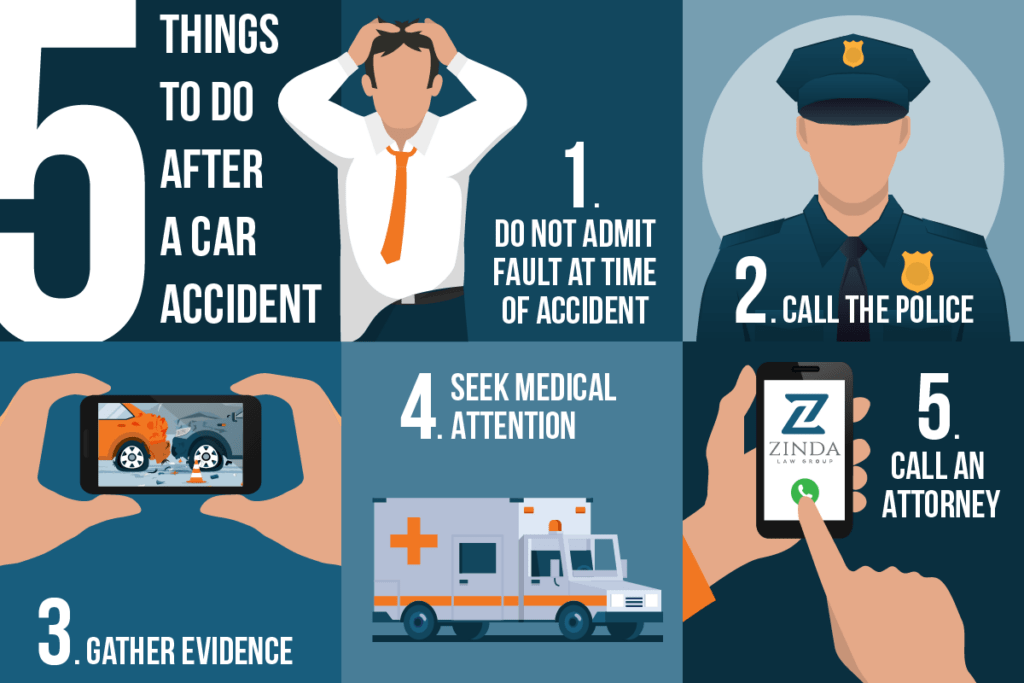Call (800) 863-5312 to Speak with Our Attorneys
Car Accident Lawyers With Nationwide Reach
Dealing with the fallout from a car accident can be extremely frustrating. Not only do car accidents leave you with injuries that may take years to heal, but they also burden you with expensive medical bills and stressful negotiations with insurance companies. When it comes to car accidents, you need experienced car accident attorneys on your side to help you seek maximum compensation. A car accident lawyer can investigate your case, gather evidence quickly, and negotiate with insurance companies on your behalf.
The experienced car accident lawyers at Zinda Law Group can help you understand your rights and secure a potential settlement. Our clients will always have a dedicated injury attorney there to help them throughout the personal injury claims process. Plus, you pay nothing unless we win your case.
If you or a loved one has been injured in a car wreck, call Zinda Law Group at (800) 863-5312 for a 100% free case evaluation with our experienced car accident lawyers. Free Consults24/7
Why Hire a Car Accident Lawyer From Zinda Law Group?
Hiring an experienced car accident lawyer to represent you reduces the chances that you make a mistake in the legal process. Additionally, a car accident lawyer may also be able to help you pursue maximum compensation for your injuries. Here are a few more reasons to hire a car accident lawyer:
1. Experience with Insurance Companies
First, insurance companies build their brand by promoting a sense of compassion and friendliness. However, at the end of the day, they are a business, and they want to make money. Simply put, they want to take in as much money as possible while paying out as little as possible. To do this, they often employ claims adjusters to get you to say things that may damage your claim. Hiring an attorney to handle these communications reduces this risk.
Read More: Can I Sue the Insurance Company?CASE RESULTS
2. Experience in Assessing Claims
Second, the legal process can be lengthy, stressful, and time-consuming. That being said, getting a bad result at the end of it can be a tough pill to swallow. Zinda Law Group car accident lawyers may be able to advise you at the outset if your insurance company is treating you fairly and whether or not your claim is worth pursuing at all.
3. Experience with the Law
Third, deciding how much money your claim is worth is a difficult task. That’s because there are many factors to consider, and settlement negotiations weigh those factors differently. Importantly, an experienced lawyer knows how much similar cases have settled for and uses this knowledge to accentuate the strong points of your claim while minimizing the weaker points
What To Do After A Car Accident has Happened?
Types of Car Accident Cases We Handle
At Zinda Law Group, our auto accident lawyers handle all types of traffic accident cases, including:
- Drunk driving accidents
- Rear-end accidents
- Head-on collisions
- Multiple-vehicle accidents
- Distracted Driving Accidents
- Texting and driving accidents
- Reckless driving accidents
- Trucking accidents
- Hit and run accidents
- Motorcycle accidents
- Motorcycle hit and run accidents
- Pedestrian accidents
- Electric scooter accidents
- Schoolbus accidents
- Uninsured or underinsured motorist accidents
- Employee vehicle accidents
- Amazon delivery accidents
- DoorDash accidents
- Self-driving vehicle collisions
- Rideshare Accidents
- Uber Accidents
- ATV Accidents
- Drugged Driving Accidents
- Snow chain liability accidents
- Brake failure accidents
If you have been hurt in any of these types of incidents, the car accident and traffic injury lawyers at Zinda Law Group can help you pursue maximum compensation your injuries.
Common Injuries in Car Accident Cases
Facial and head injuries
Notably, scrapes, bruises, lacerations, fractures, and dental injuries are common in car accidents. Specifically, facial injuries are often caused by hitting the steering wheel, dashboard, airbag, windshield, side window, or car seats, or from shattered glass. Signs and symptoms of these injuries are usually obvious.
Read More: What Should I Do If I Have Headaches After a Car Accident?
Brain injuries
Other types of injuries include brain injuries, such as concussions, post-concussion syndrome, and traumatic brain injuries. Importantly, concussions often serve as precursors to traumatic brain injuries, as well as seizures, headaches, dizziness, inability to concentrate, loss of memory, depression, and anxiety. Brain injuries are often difficult to diagnose and may not be immediately evident. Also, car accidents can cause more severe catastrophic injuries.
Neck injuries
Next, car accidents also typically cause neck injuries, such as sprains, strains, soft tissue (whiplash), neck strain, fractures, and cervical disc nerve compression (radiculopathy). Signs and symptoms of these neck injuries include neck pain and limitation of head and neck movement, pain, numbness, tingling or weakness of the extremities or along the nerve, and disc injury. Remember, early treatment is often helps soft tissue injuries, but cervical disc involvement may not be immediately evident, and may require additional testing and surgical intervention to treat.
Read More: What Should I Do If I Have Neck Pain After a Car Accident?
Chest Pain
Furthermore, chest pain is also common after a car accident. Chest pain may be a symptom of more severe injuries, like bruised or fractured bones, whiplash, or in some cases, internal organ damage.
Read More: Stomach Pain After a Car Accident
Spine and back injuries
Additionally, car accidents can also cause back sprains, strains, soft tissue injuries, fractures, and disc injuries such as bulging or herniated discs. Much like neck injuries, back injuries are not always immediately evident and can often take time and additional testing to determine the nature and extent of the injuries. Signs and symptoms can include pain, numbness, tingling, arm or leg weakness, paralysis, difficulty breathing, and loss of bladder or bowel control.
Read More: What Should I Do If I Have Muscle Spasms After a Car Accident?
Shoulder and arm injuries
Lacerations, sprains, strains, fractures, dislocations, rotator cuff injuries also result from car accidents. Injuries are usually evident immediately.
Read More: What Should I Do If I Have Shoulder Pain After a Car Accident?
Leg, Knee and Foot injuries
Car accidents can also cause lacerations, sprains, strains, fractures, joint dislocations, and injuries to the lower extremities including ligaments, hips, knees, or feet.
Psychological injuries
Finally, short and long term emotional trauma, post traumatic stress disorder, depression and anxiety are common occurrences after car wrecks.
What Is My Car Accident Case Worth?
After you’ve taken care of your injuries, you’ll probably be left thinking, “How much is my case worth?” There are a lot of factors that go into how much money, if any, you may end up with at the end of your case. A large part of that conversation involves your “damages,” which can be divided up into two categories.
Economic Damages
First, economic damages are reasonably easy to identify and prove. They include things like medical bills, damage to property that you had to pay to replace or fix, and any lost wages from not being able to work.
Non-Economic Damages
Second, non-economic damages typically refer to the pain and suffering that you experience as a result of your injuries. It is difficult to put an exact number on pain and suffering like you can for a medical bill, but non-economic damages can be granted nonetheless in certain situations.
Compensation also varies if the victim is a child. Typically, children are more susceptible to suffering lasting trauma from an accident, and this may change the ultimate settlement amount. Medical issues are also more complicated when dealing with a minor because their bodies are not yet fully developed.
Who is at Fault?
In a car accident claim, it is important to determine exactly who is at fault, and what percentage of the fault may be assigned to various parties. When talking about fault, understand that fault can often be divided up amongst multiple parties—car accidents are often messy and not clear-cut. In a car accident, some of the parties who may share in the fault include:
The Driver
First, in most accidents, the fault will be assigned to one or more of the drivers involved.
Read More:
The City
Next, in certain cases, it may be possible that the city was at fault in an accident. An example of this would be if a city did not make reasonable efforts to maintain a stoplight in working order, and that broken stoplight ended up causing a collision.
Read More: Car Accidents Caused by Unsafe Road Conditions
Bar
Plus, in states with a “dram shop” law, a bar or drinking establishment may be held liable for the injuries in an accident. These laws hold bars liable if they served a patron who was obviously intoxicated who then went on to cause a car accident while under the influence.
Read More: DWI Accident Attorneys
Our Process
Notably, no two car accident claims are the same, but they will generally follow the same basic pattern. Here are steps you should take in a car accident claim:
1. Hiring a Car Accident Lawyer
First and foremost, it is critical that you hire an experienced car accident lawyer. As stated before, the legal process is long and complicated, and it is important that you have someone on your side to help you advocate for your interests.
Learn More: When to Hire an Attorney After a Car Accident
2. Gather Information
Next, once you have hired a car accident lawyer, your attorney will work on gathering the necessary information and evidence for your case. For example, they will compile police reports, statements from witnesses of the accident, video footage of the crash, and pictures of the vehicles involved or the location where the accident took place.
Read More: How to File a Crash Report After A Car Accident
3. Negotiate a Settlement
After they gather the relevant evidence, your attorney can begin settlement negotiations with the other parties involved. An experienced attorney will use their experience settling previous cases to assist you at this stage of the process.
4. Go to Trial
In most cases, claims are resolved with a settlement. However, if this does not happen, your Zinda Law Group car accident lawyers may be available to represent you at trial.
Read More: What Not to Do After a Car Accident
Zinda Law Group Car Accident Lawyers Can Help
As you can see, car accidents can change your life in the blink of an eye and leave you struggling to support yourself and your family. Fortunately, our experienced car accident lawyers will review your case and determine if someone else is liable for your injuries and damages. If someone else is responsible for the accident, you may be able to seek maximum compensation.
If you or someone you love has been seriously hurt or killed in an auto accident, call Zinda Law Group today at (800) 863-5312 to schedule your free accident consultation with a car accident lawyer.
Related Car Accident Pages:
- Arizona Car Accident Lawyers
- Colorado Car Accident Lawyers
- New Mexico Car Accident Lawyers
- Texas Car Accident Lawyers



























